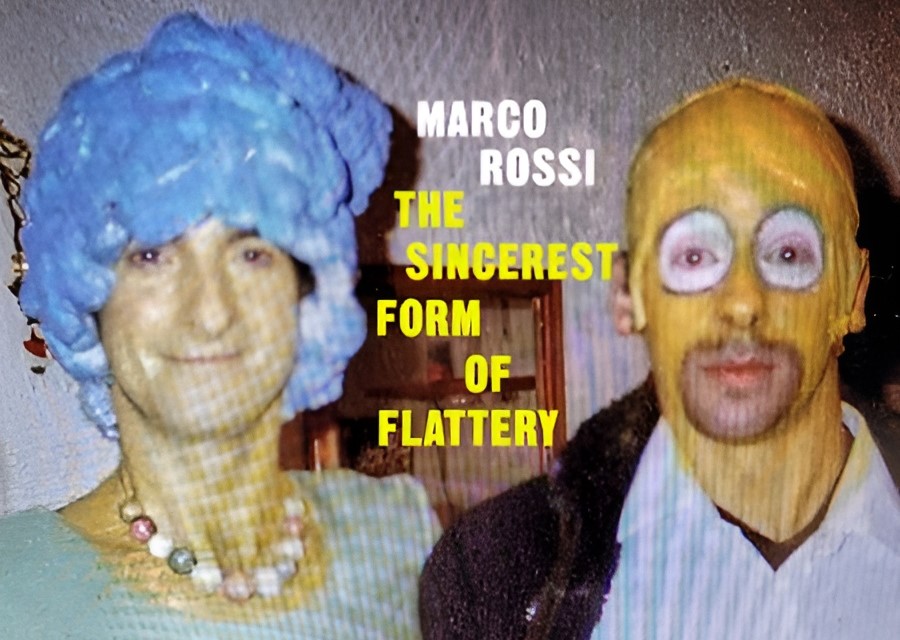
Marco Rossi’s new album The Sincerest Form of Flattery features 12 covers of classic 60s psychedelic tracks, all recorded by Marco using only his home recording gear. Marco shares his insights with Jason Barnard into the creative process behind this collection, his love for the era and how he managed to capture the feel of that time.
How did you choose the songs for this album? Were there any particular criteria you used, or was it simply a matter of choosing your favourite tracks from the 60s psychedelic era?
I mean, they’re all long-term favourites of mine, so that’s a given, and I felt that each of them deserved to be better known – even if my intercession only introduces them to one other person! Each one equates to my happy place.
But that in itself was kind of the reasoning, if you open the lens out slightly. There was a sort of political subtext in choosing songs which implicitly celebrate humanity and togetherness. It shouldn’t be political; it should be fundamental. But in the UK today, it is political, to everyone’s detriment. Even the most basic, entry-level decency is now apparently something to deride. When you get actual humans voting to curtail human rights, you know we’re a terribly long way through the mirror.
The point I’m tortuously circling here is that I locked myself upstairs to bang these tracks down because I needed to escape the news as much as possible. I needed to give my brain the occasional respite from the endless despair and fury which this government has engendered for… an eternity. I literally thought, ‘What’s the opposite of Brexit? I know: sunshine pop.’
Not all of the songs I chose necessarily fit the sunshine pop pigeonhole, but they all represent warmth, inclusivity, compassion, openness, hope and harmony to me. In other words, the opposite of the hatred and othering which is this government’s default setting and vote-winning rocket fuel. I’m tacitly taking a stand!
That’s also the reason I covered ‘Get Together’, which I’m fairly certain is probably the only song on there that is widely known outside psych circles. Dino Valenti was by all accounts a bit of a nippy sweetie, but he nevertheless wrote a song that is so emblematic that I felt it was a good way to nail my colours to the mast. I genuinely believe in all that stuff. If we aren’t here to look out for each other, I honestly don’t know what the point of us is.
What is it about 60s psychedelia that continues to resonate with music fans today? Why do you think this music has endured over the decades?
I always think there’s a limitless amount left in the tank where psychedelia is concerned, because it’s all about exploration and experimentation. It gazes infinitely outward or infinitely inward. Until such a time as we reach the bump stops at the end of the universe, there’s just so much still to discover, and the questing nature of psychedelia reflects that for me.
I mean, there are obviously certain signifiers relating to ’60 psychedelia which in one sense date it, very deliciously – double-breasted brocade jackets, Binson Echorecs, etc – but the best music from that period seems filled with the excitement of travelling, to me. In things like ‘Children Of The Sun’ or ‘Astronomy Domine’, say, you get this sense of hurtling, ascending. Never anything as mundane as arriving! When I hear songs like that, I feel as though the recording was someone briefly opening a window on a perpetual-motion entity which existed forever beforehand and will exist forever after when the window is closed again. We just caught a little bit of it, and are blessed to have done so.
Can you tell us about your process of recording this album in your son’s old bedroom with just one mic? What were some of the challenges you faced, and how did you overcome them?
There were some fairly mundane aspects to consider, if I’m honest! Things like trying not to rile the neighbours, passers-by and people who sat on the river wall opposite when I was sticking down a drum track. We’re lucky enough to be renting a place which is semi-detached, but I was still very conscious of trying not to test anyone’s forbearance.
The drums were always the most problematic element. With one mic, there would always be a sweet spot where the kit sounded great, but for some reason that never seemed to be quite the same spot two days running. Also, my son’s old room is quite small, so I had to go without a click track because I simply couldn’t hear it in the headphones over me hammering away on the kit.
The bed is still in there and takes up most of the room, but I’m convinced – or I’ve convinced myself – that it contributes really nicely to the overall drum sound! It’s an odd-shaped room, which is great because you don’t get standing waves, and the kit sounds very bright and lively in there as a result… but I honestly think the bed absorbs the more obtrusive ring you might expect from an un-damped kit with no duct tape on the heads.
You’ve said that you want to be every member of the bands you adore. What is it about these bands that you find so compelling, and how do you try to capture that in your own music?
Oh man, the older I get the more miraculous I find it that these bands ever existed at all. I think with each of them, it’s a perfect storm of impeccable music and a fantastic image, which was usually nothing more than them looking like they would have looked anyway, wearing the great clothes that you could pretty much nab off the shelf at the time. (If you could afford Thea Porter shirts and Granny Takes A Trip jackets, admittedly.)
The first time I came across The Left Banke, for example, which was via the Bam-Caruso comp that came out in the early ’80s, I thought they were so perfect that I simply couldn’t believe they were real. I honestly thought someone had invented them after the fact, specifically to push every last one of my buttons.
Their influence, like that of many of their peers, is omnipresent in the stuff I try to write because of those gushing, swooning melodies that seem hard-wired to avoid cliché and obvious resolution. I’ll also be forever chasing the rapt, time-suspended mood of songs like ‘Ivy Ivy’, ‘Dark Is The Bark’ and ‘Shadows Breaking Over My Head’ which are as close to actual magic as anything I’ve ever experienced.
I’ve also always thought there was something innately noble about being a foot-soldier as opposed to being the main draw. What’s better than being Johnny Johnson? Being a member of The Bandwagon.
How has the experience of reviewing for Shindig! magazine influenced your approach to making music, if at all?
Shindig! is such a great thing. I think its biggest impact is that it has brought to light the very cheering realisation that there actually is a community of us. That there actually are a substantial number of people who might share your tastes from pole to pole and, crucially, still keep their enthusiasm intact and their ears open to new music.
In terms of actually making music, it has made me realise that there’ll always be someone out there who is interested, however punitively niche your thing might be. I also find myself hugely intimidated by thinking of fellow writers who I really admire, terrified at the thought that they might find my stuff beneath contempt! The other side of that is that should any of them offer any words of praise, it feels like winning all the lotteries at once.
You mentioned that you’ve been evangelical about the bands you love, and have been compiling mixtapes for a long time. Do you think the way people consume music affects the way musicians and music fans interact with each other?
I think about this all the time. There’s a convenience about streaming key songs which, if I’m honest, isn’t too far in essence from what you’d have done years ago if you were compiling a mixtape and/or just trying to get someone else into one of your favourite bands. You cut to the chase, basically.
That said, there’s something really beautiful about the sacramental nature of sitting down communally with pals and listening attentively to the, ah, journey of an entire album on vinyl. Taking it from the sleeve, blowing the dust off, placing the needle down, staring at the sleeve while you listen, and/or skinning up on it.
I honestly don’t know what’s best, if anything is, but I know from interactions with people on music Twitter who I haven’t even met in real life that however aesthetically gorgeous the vessel might be, it’s the music itself that’s the thing. I think if it lights you up, by whatever means, then that’s the part that testifies to a song’s life-enhancing power.
If you’re a musician, it can perhaps be galling if people cherry-pick from something you regard as an all-of-a-piece magnum opus, but the fact that anyone at all is listening is a gift; and even if 99% of your audience opt for ‘Strawberry Fields Forever’, there’ll always be the 1% that prefer ‘Act Naturally.’
You covered a range of artists on this album, from The Left Banke to We The People. Were there any particular artists or songs that were especially challenging to recreate, and why?
I think with all of them, the common thread was that there was something in the song that made me think, how did they play that? I’ve been playing in bands forever, and I’m a relatively good bluffer, so I’ve usually been able to sit in with bands and anticipate where a song might go in terms of chord progressions, dynamics, etc. But when I hear something that has an unexpected sequence, or chord voicings that I can’t automatically identify, I’m instantly sitting up.
‘Ivy Ivy’ has a wonderfully mystical and bereft arpeggiated guitar part which is… a stretch. I still can’t believe they went for it, but I’m forever grateful they did. ‘L.A’ was something that just didn’t sound quite right when I was recording it until I realised that there are four harmonies in it, not three. That realisation kicked the doors down! ‘Forget All About It’ has a tricky piece of timing in the intro that I’d never consciously sat down to count. Once I’d clocked it, that was another thing that felt like a lottery win. And that amazing Eastern riff that runs through ‘In The Past’ is another that doesn’t fall readily to hand. I figured it out and laid it down, but it still didn’t sound correct until I realised I needed to tweak the voicing of the second chord in the sequence behind it. That made all the difference, somehow.
What are your plans for the future, musically speaking? Do you have any upcoming projects or collaborations that you’re excited about?
I’m actually about three-quarters of the way through mixing and mastering an album of original material, which is what I was really doing before I distracted myself with the covers! The covers were only ever something I did to cheer myself up and lay down a tiny marker for unity and empathy, as I mentioned earlier, and to hopefully receive a small measure of validation from a handful of pals on Facebook. It was never really intended to go any further than that, and I’m beyond delighted and flattered that the Fruits de Mer label felt it might be worth introducing the stuff to anyone else. I love that.
Further information
Marco Rossi – The Sincerest Form Of Flattery, on sale at Fruits de Mer from late-May:




